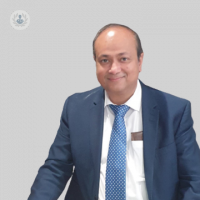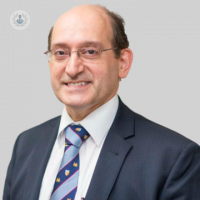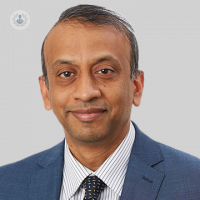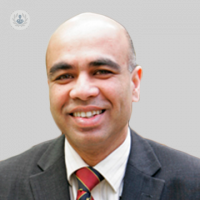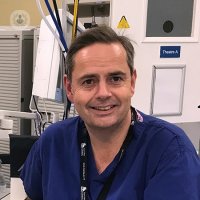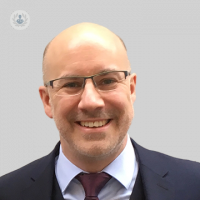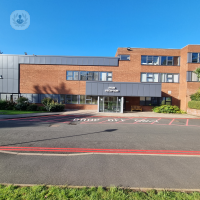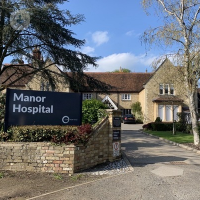What is thyroid surgery?
Thyroid surgery removes all, or part, of the thyroid gland. It is also known as a ‘thyroidectomy’. This operation can be used to treat thyroid cancer, hyperthyroidism (excess of thyroid hormone), and thyroid nodules.
A surgeon specialising in thyroid and endocrine surgery performs thyroid surgery.

Why is thyroid surgery performed?
The thyroid gland, located in the neck, produces thyroid hormone, which controls the body’s metabolism. Thyroid surgery may be performed for different reasons, but the most common is the growth of tumours or nodules (usually non-cancerous lumps) on the thyroid. Surgery can also correct hyperthyroidism, a condition in which too much thyroid hormone is produced.
Thyroid surgery may also be performed as a treatment method for goitre, which refers to swelling or enlargement of the thyroid gland. Goitres can be large enough to block the throat, which affects the patient’s ability to swallow and breathe, among other things.
What does thyroid surgery involve?
The type of surgery offered will depend on the patient and how suitable they are – there are various types of procedure and the surgeon will advise which is best. The most common types of procedure include lobectomy, total thyroidectomy, and subtotal thyroidectomy.
Lobectomy
One of the two lobes in the thyroid gland is removed. This is performed in patients where swelling, cancers, or nodules only affect half of the thyroid gland.
Subtotal thyroidectomy
The thyroid is removed, but a little thyroid tissue is left behind. This means the function of the thyroid gland remains intact. However, this can cause hypothyroidism (where not enough thyroid hormone is produced).
Total thyroidectomy
The entire thyroid gland is removed along with the tissue. This surgery is usually indicated in cases where nodules or swelling affect the whole thyroid gland, or in cancer patients.
During surgery, an incision is made in the neck to remove the thyroid gland, or part of it. The procedure is performed under general anaesthetic, meaning the patient is not conscious throughout. Thyroid surgery can also be performed as a minimally invasive procedure.
How can you prepare for thyroid surgery?
An initial consultation must be made before the surgery is scheduled, to check if the patient is a candidate for thyroid surgery. The surgeon will advise any precautions which need to be taken, and will explain what is safe to take regarding medications, if the patient has any prescribed. Blood thinners must not be taken for several days before surgery (e.g ibuprofen, aspirin). The surgeon can answer questions the patient may have about the procedure during the consultation.
Post-operative care
Thyroid surgery is generally successful and complications are infrequent. After the surgery, a few days off work is expected, and driving should not be considered until the patient can turn their head from side to side, and is no longer taking medication for pain relief. After the operation, discomfort is normal, and the patient may feel that they have a sore throat for a few days afterwards.
Patients should expect a scar to form, which over the months following the operation will gradually fade until it is barely noticeable.
In some cases, hypothyroidism is a side effect of surgery. Hypothyroidism can be managed with hormone replacement, and patients can expect to live a normal, healthy life.
Thyroid surgery
Mr Antony Pittathankal - Surgery
Created on: 11-13-2012
Updated on: 10-17-2023
Edited by: Jay Staniland
What is thyroid surgery?
Thyroid surgery removes all, or part, of the thyroid gland. It is also known as a ‘thyroidectomy’. This operation can be used to treat thyroid cancer, hyperthyroidism (excess of thyroid hormone), and thyroid nodules.
A surgeon specialising in thyroid and endocrine surgery performs thyroid surgery.

Why is thyroid surgery performed?
The thyroid gland, located in the neck, produces thyroid hormone, which controls the body’s metabolism. Thyroid surgery may be performed for different reasons, but the most common is the growth of tumours or nodules (usually non-cancerous lumps) on the thyroid. Surgery can also correct hyperthyroidism, a condition in which too much thyroid hormone is produced.
Thyroid surgery may also be performed as a treatment method for goitre, which refers to swelling or enlargement of the thyroid gland. Goitres can be large enough to block the throat, which affects the patient’s ability to swallow and breathe, among other things.
What does thyroid surgery involve?
The type of surgery offered will depend on the patient and how suitable they are – there are various types of procedure and the surgeon will advise which is best. The most common types of procedure include lobectomy, total thyroidectomy, and subtotal thyroidectomy.
Lobectomy
One of the two lobes in the thyroid gland is removed. This is performed in patients where swelling, cancers, or nodules only affect half of the thyroid gland.
Subtotal thyroidectomy
The thyroid is removed, but a little thyroid tissue is left behind. This means the function of the thyroid gland remains intact. However, this can cause hypothyroidism (where not enough thyroid hormone is produced).
Total thyroidectomy
The entire thyroid gland is removed along with the tissue. This surgery is usually indicated in cases where nodules or swelling affect the whole thyroid gland, or in cancer patients.
During surgery, an incision is made in the neck to remove the thyroid gland, or part of it. The procedure is performed under general anaesthetic, meaning the patient is not conscious throughout. Thyroid surgery can also be performed as a minimally invasive procedure.
How can you prepare for thyroid surgery?
An initial consultation must be made before the surgery is scheduled, to check if the patient is a candidate for thyroid surgery. The surgeon will advise any precautions which need to be taken, and will explain what is safe to take regarding medications, if the patient has any prescribed. Blood thinners must not be taken for several days before surgery (e.g ibuprofen, aspirin). The surgeon can answer questions the patient may have about the procedure during the consultation.
Post-operative care
Thyroid surgery is generally successful and complications are infrequent. After the surgery, a few days off work is expected, and driving should not be considered until the patient can turn their head from side to side, and is no longer taking medication for pain relief. After the operation, discomfort is normal, and the patient may feel that they have a sore throat for a few days afterwards.
Patients should expect a scar to form, which over the months following the operation will gradually fade until it is barely noticeable.
In some cases, hypothyroidism is a side effect of surgery. Hypothyroidism can be managed with hormone replacement, and patients can expect to live a normal, healthy life.


Worried that your teenager has a thyroid problem? A guide to thyroid disorders in adolescents
By Dr Mark Vanderpump
2024-11-21
Teenagers can have mood swings and concentration problems, but what if these were also symptoms of a thyroid disorder? Dr Vanderpump talks hyperthyroidism, hypothyroidism and Grave's disease in children. See more


Voice changes after thyroid surgery: Does thyroid hoarseness go away?
By Mr Radu Mihai
2024-11-21
After thyroid surgery, your voice could change for several reasons. In some cases, voice changes are temporary and in other cases, they are permanent. Does thyroid hoarseness go away? Mr Radu Mihai provides you with an in-depth guide on the potential voice changes you may experience, what can cause them and much more. See more


Thyroid surgery: an expert's explanation
By Mr Sid Nagala
2024-11-21
Thyroid surgery, also known as thyroidectomy, is a procedure that involves the removal of all or part of the thyroid gland. The thyroid gland is a butterfly-shaped organ located in the front of the neck that produces hormones that regulate metabolism, growth, and development. Renowned consultant ENT Surgeon Mr Sid Nagala explains more about the surgery. See more
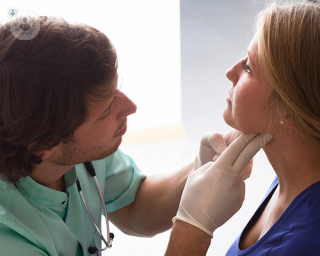

When should the thyroid gland be removed?
By Mr Andrew Moore
2024-11-21
What does thyroid removal surgery involve? We find out here in this article as highly esteemed consultant ENT head and neck surgeon, Mr Andrew Moore, tells us more. See more
Experts in Thyroid surgery
-
Mr Ragheed Al Mufti
SurgeryExpert in:
- Breast surgery
- Breast reconstruction
- Thyroid surgery
- Parathyroid gland surgery
-
Mr Prasad Kothari
Otolaryngology / ENTExpert in:
- Snoring
- Difficult Swallowing (Dysphagia)
- Head and neck cancer
- Neck lump
- Thyroid surgery
- Paediatric ENT
-
Mr Mriganka De
Otolaryngology / ENTExpert in:
- Parathyroid gland surgery
- Neck lump
- Salivary gland surgery
- Robotic surgery
- Thyroid surgery
- Tonsillectomy
-
Mr Simon Smith
SurgeryExpert in:
- Breast reduction
- Breast augmentation
- Breast cancer
- Breast lumps
- Parathyroid gland surgery
- Thyroid surgery
-
Mr Michael Stechman
SurgeryExpert in:
- Endocrine Surgery
- Cholelithiasis (gallstones)
- Inguinal hernia
- Hyperparathyroidism
- Hernia
- Thyroid surgery
- See all

The Priory Hospital - part of Circle Health Group
The Priory Hospital - part of Circle Health Group
Priory Road, Edgbaston, Birmingham B5 7UG
No existe teléfono en el centro.
By using the telephone number provided by TOP DOCTORS, you automatically agree to let us use your phone number for statistical and commercial purposes. For further information, read our Privacy Policy
Top Doctors

The Manor Hospital - part of Circle Health Group
The Manor Hospital - part of Circle Health Group
Church End, Biddenham, Bedford MK40 4AW
No existe teléfono en el centro.
By using the telephone number provided by TOP DOCTORS, you automatically agree to let us use your phone number for statistical and commercial purposes. For further information, read our Privacy Policy
Top Doctors

The ENT Consultancy
The ENT Consultancy
23 Craven Rd, Reading
No existe teléfono en el centro.
By using the telephone number provided by TOP DOCTORS, you automatically agree to let us use your phone number for statistical and commercial purposes. For further information, read our Privacy Policy
Top Doctors
-
The Priory Hospital - part of Circle Health Group
Priory Road, Edgbaston, Birmingham B5 7UG, EdgbastonExpert in:
- Cancer
- General Surgery
- Orthopaedic surgery
- Thoracic Surgery
- Obstetrics and Gynaecology
- Urology
-
The Manor Hospital - part of Circle Health Group
Church End, Biddenham, Bedford MK40 4AW, BedfordExpert in:
- General Surgery
- Orthopaedic surgery
- Physiotherapy
- Obstetrics and Gynaecology
- General practice
- Urology
-
The ENT Consultancy
23 Craven Rd, Reading , ReadingExpert in:
- Voice disorders
- Ear infection
- Hearing loss
- Adult and paediatric services
- See all
- Most viewed diseases, medical tests, and treatments
- Hormone therapy
- Migraine
- Autoimmune diseases
- Weight loss injections
- Nipple discharge
- Abdominal pain
- Endovenous laser treatment (EVLA)
- Minimal access surgery (keyhole surgery)
- Head and neck cancer
- Neck lump
